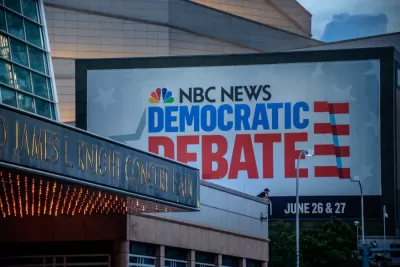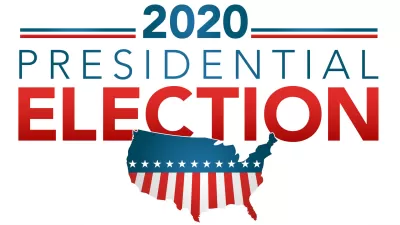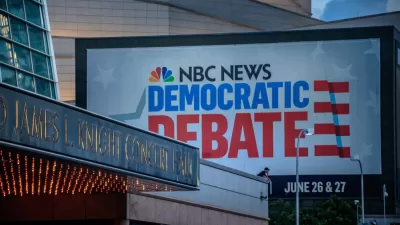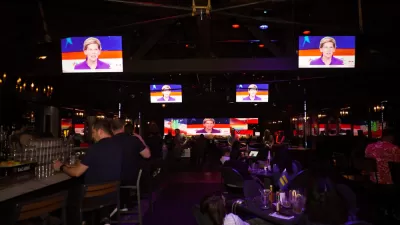Candidates drop names for a reason.

Despite campaign platforms and media coverage that have focused with unprecedented intensity on matters related to the built and natural environments, last week's Democrat Candidate debates featured only one signature moment that addressed urban policies: the tit-for-tat between Senator Kamala Harris and former Vice President Joe Biden over bussing policies in Berkeley, California, which has been widely discussed in the media since the debates.
Laura Bliss writes for CityLab to document the other, less ballyhooed mentions of urban policy and specific local contexts throughout the two-day debate event.
Bliss prefaces this analysis with an interesting idea about the way candidates use references to local and regional signifiers to build credibility and recognition with the audience:
On a presidential debate stage, place matters. With a slew of candidates jockeying for breakout moments and, in many cases, introducing themselves to a national audience for the first time, regional identifiers are one of the best sorting mechanisms voters get. But presidential aspirants must balance playing up their hometown roots to tell stories and display their relatability with the need to make sweeping gestures toward national reconciliation. Many reeled off campaign stops to build credibility with unfamiliar regions. Some places appeared as political touchstones, like the locations of recent mass shootings, or synecdoches like “Washington” and “Wall Street.” Certain candidates repeatedly highlighted geography as destiny—but it may be just as telling who abandoned their atlases.
The article includes a map of the specific place references that also indicates the candidates' hometowns, as well as a map of worldwide locations referenced by the candidates. The bulk of the article is devoted to each reference by candidates of specific locations and policies that affect communities.
Under the criteria for the next round of debates, scheduled for July, only 14 of the current candidates would qualify, so the sample size of opinion on matters involving cities from the Democratic candidates for president is bound to start shrinking, and soon. The criteria get even more stringent in September.
FULL STORY: We Mapped Every Place Mentioned by the Democratic Candidates

Alabama: Trump Terminates Settlements for Black Communities Harmed By Raw Sewage
Trump deemed the landmark civil rights agreement “illegal DEI and environmental justice policy.”

Planetizen Federal Action Tracker
A weekly monitor of how Trump’s orders and actions are impacting planners and planning in America.

The 120 Year Old Tiny Home Villages That Sheltered San Francisco’s Earthquake Refugees
More than a century ago, San Francisco mobilized to house thousands of residents displaced by the 1906 earthquake. Could their strategy offer a model for the present?

Ken Jennings Launches Transit Web Series
The Jeopardy champ wants you to ride public transit.

BLM To Rescind Public Lands Rule
The change will downgrade conservation, once again putting federal land at risk for mining and other extractive uses.

Indy Neighborhood Group Builds Temporary Multi-Use Path
Community members, aided in part by funding from the city, repurposed a vehicle lane to create a protected bike and pedestrian path for the summer season.
Urban Design for Planners 1: Software Tools
This six-course series explores essential urban design concepts using open source software and equips planners with the tools they need to participate fully in the urban design process.
Planning for Universal Design
Learn the tools for implementing Universal Design in planning regulations.
Clanton & Associates, Inc.
Jessamine County Fiscal Court
Institute for Housing and Urban Development Studies (IHS)
City of Grandview
Harvard GSD Executive Education
Toledo-Lucas County Plan Commissions
Salt Lake City
NYU Wagner Graduate School of Public Service





























